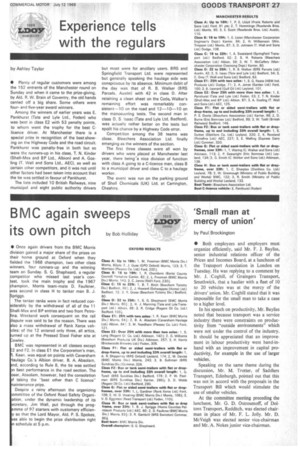'Small man at mercy of union'
Page 29

If you've noticed an error in this article please click here to report it so we can fix it.
by Paul Brockington
• Both employees and employers must organize efficiently, said Mr. F. J. Bayliss, senior industrial relations officer of the Prices and Incomes Board, at a luncheon of the Transport Association in London on Tuesday. He was replying to a comment by Mr. J. Coghill, of Graingers Transport, Smethwick, that a haulier with a fleet of 10 to 20 vehicles was at the mercy of the drivers' union. Mr. Coghill stated that it was impossible for the small man to take a case to a higher level.
In his speech on productivity, Mr. Bayliss noted that because transport was a service industry there were constraints on productivity from "outside environments' which were not under the control of the industry. It should be appreciated that an improvement in labour productivity went hand-inhand with an improvement in capital productivity, for example in the use of larger vehicles.
Speaking on the same theme during the discussion, Mr. M. Trotter, of Saddlers Transport, Edinburgh, pointed out that this was not in accord with the proposals in the Transport Bill which would stimulate the use of smaller vehicles.
At the committee meeting preceding the luncheon, Mr. G. D. Ostroumoff, of Doitons Transport, Redditch, was elected chairman in place of Mr. F. L. Jolly. Mr. D. McVeigh was elected senior vice-chairman and Mr. A. Nokes junior vice-chairman.












































































































